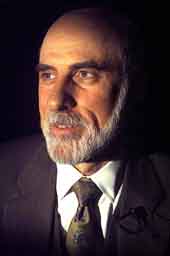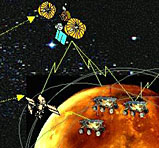|
Vinton Cerf
–
Father of the Internet
|

|
"
I think [creativity] is simply a matter of avidly putting together ideas that don't necessarily go together at first...
" |

|
| |
|
|
|
| |
How were you motivated to choose your particular field? |
| |
I was first introduced to computers in 1958 when I visited the Semi–Automated Ground Environment computer in Santa Monica, California at the System Development Corporation. This was a three–room, tube–based (!!!) computer that analyzed radar returns from the Distant Early Warning radar network in the northern part of Canada. These radars were looking for bombers coming to North America from the Soviet Union. I was fascinated by the concept of computing. Two years later, my best friend, Steve Crocker, introduced me to a Bendix G–15 paper tape computer at UCLA and we programmed it while we were still high school students. After I got to Stanford as an undergraduate, I took all the computer science courses I could and then went to work for IBM.
I was introduced to computer networking at UCLA after I returned to school for graduate work. I was working on the ARPANET – the first wide–area packet switching computer network. The idea of connecting computers and interacting with them remotely or having them interact with each other was completely captivating. Later I got involved in the design of the Internet with my colleague, Bob Kahn and completed the first published design in 1974. From then on, I was HOOKED on networking!!
|
|

|
| |
|
|
|
| |
What can you share about your creative process? |
| |

|
|
I think it is simply a matter of avidly putting together ideas that don't necessarily go together at first – or trying to find ways of linking systems that were not designed to work together initially. The tinker–toy theory of networking so to speak. I'm fascinated by finding simple rules that will allow complex systems to interwork – and that is, of course, at the heart of the Internet and its TCP/IP standards.
|
|
| |
|
|
|
| |
What ideas do you have for a future human community on Mars?
|
| |
Well, you could read the three–book series on Mars by Kim Robinson, which recounts such a colony. I would expect them to live in a kind of observation post area (10–km circle) initially but over time they would surely do a good deal of exploration. They would use satellite communication to manage remotely piloted vehicles on the planet to explore where they might not be able to go themselves. Some would stay in orbit around the planet and others settle into research station facilities on the surface, much like the Antarctic stations on Earth. I would want them to be able to communicate with each other over a Mars Internet and with Earth through the Interplanetary Internet – they would want very much to stay in touch with family and friends on Earth during their sojourn on Mars.
|
|

|
|




